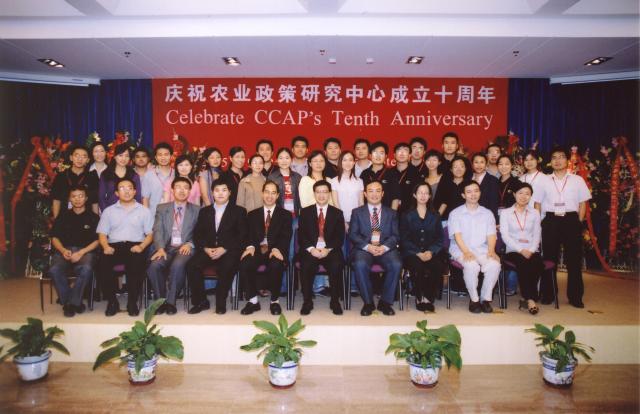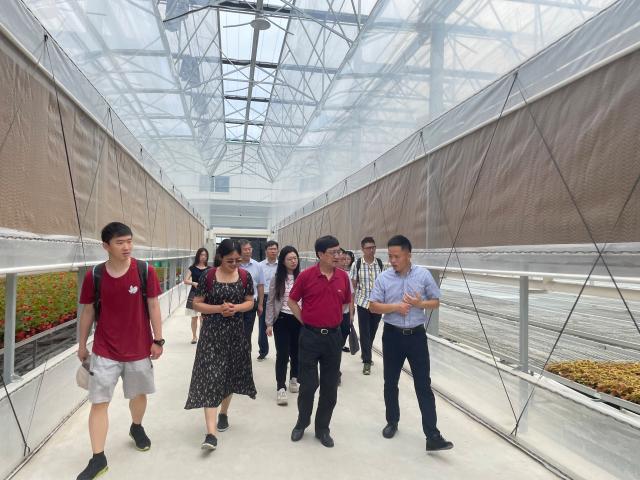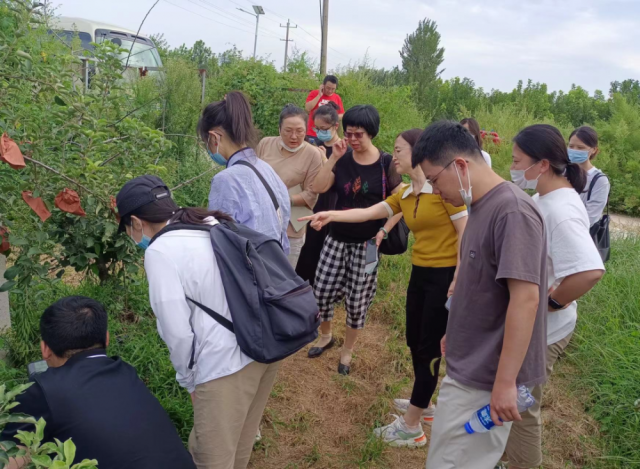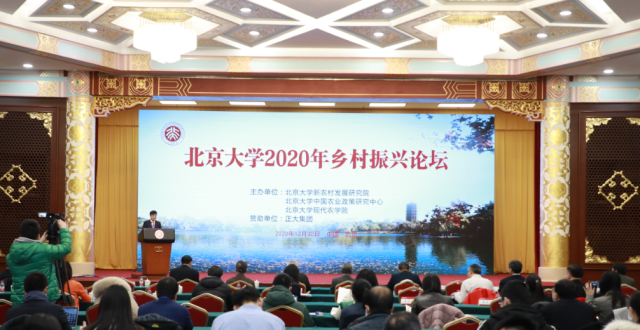current location: Home> Central News
Central News
Cultivating agricultural and economic leaders to serve national strategic needs
Release date:2023/02/20 Source: Agricultural Economics Newsletter
Ensuring China's food security and green agricultural development, ensuring farmers' income growth, narrowing the income gap between urban and rural areas, and promoting the inclusive development of the countryside are the necessary paths for the modernization of China's agriculture, and are also the top priorities for solving China's "Three Rural Issues" and guaranteeing the country's stable socio-economic development. The era calls for scholars in agricultural and forestry economic management to carry out in-depth and systematic research on major scientific and policy issues that are fundamental, forward-looking and strategic for China's agricultural and rural development. Against this background, the China Center for Agricultural Policy (CCAP) at Peking University was established in response to the call of the times and to serve the strategic needs of the country. Since 1995, under the leadership of Professor Huang Jikun, the founder of CCAP, and the cohesion of the core cadres, CCAP has gone through an unusual and brilliant development process; in 2021, Professor Wang Jinxia took over as the director of CCAP and led the center to enter a new stage of development. 27 years ago, CCAP not only achieved a series of original achievements in academics leading the domestic and foreign agronomical and economic circles, but also contributed to the development of China's and the world's agricultural economy and rural areas, and the development of the "Three Rural Areas" for the country. It has not only made a series of original academic achievements leading the agricultural economics and rural development in China and the world, and provided an important scientific basis for the national decision-making on the "Three Rural Issues", but has also become a well-known training base for leading talents in agricultural economics at home and abroad, with a number of young and middle-aged leaders in the domestic agricultural economics field having studied or worked in CCAP, and a number of renowned experts in the international agricultural economics field having been CCAP's long-term partners.
I. History of CCAP and its mission and beliefs
In September 1995, Professor Huang Jikun returned from the International Food Policy Research Institute (IFPRI) and founded CCAP at the Institute of Agricultural Economics of the Chinese Academy of Agricultural Sciences (CAAS), which was funded by the National Natural Science Foundation of China (NSFC). Afterwards, CCAP, under the leadership of Prof. Huang Ji-kun, utilized international cutting-edge theories and research methods, through extensive cooperation with scholars at home and abroad, and carried out many large-scale field surveys in rural China, obtaining valuable first-hand information and producing a series of original results, which were highly valued by domestic and foreign academics and governmental departments.In 2001, CCAP was awarded the first batch of "Innovative Research Groups" funded by the Natural Science Foundation of China (NSFC). "In 2001, CCAP received the first batch of funding from the Natural Science Foundation of China (NSFC) as an innovative research group, and in the same year, CCAP was invited to join the Institute of Geographic Sciences and Resources of the Chinese Academy of Sciences (IGSR), expanding its cross-disciplinary research, and the team was further developed and expanded. CCAP has not only continued its efforts in scientific research and serving national strategies, but also undertaken the important task of constructing the first-level discipline of Agricultural and Forestry Economic Management in CAS, and made outstanding contributions in talent cultivation.

At the end of 2015, eight core cadres of CCAP were invited to join Peking University and set up an agricultural economics teaching and research team in the then newly established School of Modern Agriculture. Since joining Peking University, CCAP has introduced three young and middle-aged talents from home and abroad, and together with colleagues engaged in agricultural and rural development research at Peking University, integrated the strength of the whole university to form a teaching and research team of the first-level discipline of Agricultural and Forestry Economics and Management at Peking University based on the School of Modern Agriculture and with the participation of several faculties and departments, so as to further accelerate the process of building a first-class discipline in the international arena.CCAP is divided into four core research areas, three supporting departments and one graduate training department. CCAP consists of four core research areas, three supporting departments and one graduate training department. The four core areas are: Economics of Agricultural Science and Technology, Economics of Food and Agriculture, Economics of Resources and Environment, and Economics of Rural Development; and the three supporting departments are the Administrative Office, the Outreach Department, and the Network and Database Management Department.

The development of CCAP has witnessed and supported the great success of China's agricultural and rural reform, and is the process by which China's scholars of Agricultural Economics have gradually gone global and grown stronger. The CCAP has always adhered to its beliefs and missions: to establish and maintain a world-class teaching and research team in agricultural economics and the discipline of agricultural economics and management; to promote the development of the discipline of agricultural economics and management based on China and facing the world by carrying out rigorous and scientific theoretical and applied researches; to set up a base for educating high-end talents and to cultivate first-class talents in the discipline of agricultural economics and management for both domestic and foreign countries; to establish a bridge for international academic exchanges and to enhance the exchanges between domestic and foreign counterparts; and to promote the dissemination of CCAP's research results and to develop agricultural and rural economic development policies for China and other CCAP has always been based on the international academic frontier to carry out scientific and standardized research, actively participate in international academic exchanges and cooperation, and is an important bridge and academic platform for domestic and foreign agricultural economics exchanges.
II. The main experience of CCAP in scientific research and human training
First, oriented by national needs, CCAP deploys frontier research programs in advance with major scientific and policy issues as research objects, and dynamically adjusts the key directions of research in real time according to the expected changes at home and abroad.
In the field of agricultural science, technology and economics, CCAP prepared a research program on the economics and policies of agricultural biotechnology in 1996 and launched a research program on the economics and policies of agricultural biotechnology in the following year in response to the forward-looking prediction of the development of biotechnology and the socio-economic problems that it might cause, becoming one of the earliest institutions in the international arena to initiate research in this field. In 2002, CCAP's research results were published in Science and Nature journals on the socio-economic impacts of genetically modified crops. In addition, CCAP has carried out a series of important research topics closely related to national needs, such as national agricultural science and technology innovation system and policy, bioenergy technology, economy and policy, and information technology and agricultural development. In the field of food and agricultural economy research, CCAP has been engaged in the construction of agricultural policy analysis and forecasting and decision support system since its establishment, and then initiated the research on global climate change and assessment modeling system, presided over the project of basic research on climate change socio-economic system impact system, and became the first research team of scholars of economic and management disciplines to serve as chief scientists of the "973" program in China. It has become the first research team in China to have a scholar from the discipline of economics and management as the chief scientist of the "973" program. In the field of resource and environmental economics, CCAP was the first team in the domestic agricultural economics field to initiate policy research on sustainable utilization of soil and water resources, and has successively carried out research on new topics such as surface pollution, green agriculture and ecological compensation. In the field of rural development economics, in addition to the early research on rural public goods and services and governance, CCAP has also carried out research on urban and rural factor reform, rural education action plan (REAP) research, and agricultural development and rural transformation paths.
Secondly, CCAP emphasizes the collection of large-scale, long-term follow-up rural primary data and data accumulation, and conducts high-quality empirical research based on solid and reliable data.
CCAP is the earliest research team in the domestic agricultural economics sector to conduct large-scale, long-term tracking and household research in rural areas using scientific and standardized research questionnaires, and the team's empirical research mainly relies on primary data collected in the field. In order to ensure the quality of the data, CCAP team members design their own survey outlines, conduct pre-surveys, train investigators, and carry out household surveys.The CCAP database platform includes not only long-term tracking comprehensive survey databases (e.g., the China Agricultural and Rural Development Tracking Survey 2000-2021), but also special survey databases for long-term tracking in the four research areas. It is precisely because of the detailed and reliable data support that CCAP has been able to achieve a series of research results, and the research in several fields has entered the international leading ranks. In addition, through in-depth exchanges with grassroots cadres and the general public, the research team has been able to identify new trends and problems in agricultural and rural development in a timely manner, so as to update the research topics in time and better serve the needs of the country.


Thirdly, it carries out standardized research by applying cutting-edge economic theories and methods, focusing on the organic combination of micro- and macro-research, and actively promoting cross-disciplinary research.
CCAP has attached great importance to standardized scientific research from the date of its establishment, and has adhered to rigorous and standardized scientific procedures from the design of research topics, data collection, quantitative analysis to the publication of results, and has made use of cooperative research exchanges and training courses to keep abreast of cutting-edge methodologies in the discipline and apply them to its research. CCAP not only attaches great importance to empirical analysis based on primary data, but also highly values the forecasting and policy analysis of partial and general equilibrium models based on macro data, and many key parameters in the modeling system created by CCAP are derived from empirical research results, thus realizing an organic combination of micro and macro research, which is also a major feature of CCAP that distinguishes it from other research institutes. In addition, CCAP's research team has focused on cross-disciplinary research at an early stage, and its key personnel have cooperated effectively with many natural scientists in agronomy, forestry, geography, hydrology, ecology and mathematics in the four research fields over a long period of time, so as to give full play to the advantages of cross-disciplinary research and to safeguard the cutting-edge and scientific nature of academic research.
Fourth, the team's group and collaborative advantages are utilized to build a perfect postgraduate course system and provide students with practical exercise opportunities.
The educational goal of CCAP is to establish morality and cultivate high-end specialists who have all-round development in morality, intellect, physique and aesthetics, who have a comprehensive and systematic mastery of the theories of economics and management as well as the relevant knowledge of agriculture and forestry sciences, and who are able to independently engage in teaching, scientific research and management. To this end, CCAP gives full play to the advantages of teamwork and collaboration, and the cross-collaboration of research topics among the academic backbones has formed a close-knit research group, which promotes the interaction and exchange among the backbones and between the backbones and the students.CCAP has constructed a comprehensive postgraduate program system with Chinese characteristics and international frontiers, focusing on cultivating postgraduates' disciplinary foundations, professional knowledge, innovative thinking, national sentiments and international vision. CCAP actively guides students to carry out standardized research based on scientific research projects, and strengthens cooperation and synergy with universities, enterprises and local research bases to create favorable conditions for students to improve their practical abilities.
Domestic and foreign cooperation is an important means to improve CCAP's international academic level and status, as well as to cultivate and attract foreign talents. Therefore, while cooperating with domestic counterparts, CCAP has also established long-term, stable and pragmatic cooperative research relationships with major international organizations and research institutes, as well as scientific research, teaching and funding institutions in many countries, etc. CCAP often organizes a variety of international academic conferences or large-scale policy forums, and its team of scholars is often invited to participate in influential international academic conferences and make conference theme and special reports, and through the academic series of reports. CCAP scholars are often invited to participate in influential international conferences and give keynote and special lectures, and communicate with their peers in the form of academic lecture series (e.g., the "Lecture Series of Internationally Eminent Scholars" and the "Lecture Series of Frontiers of Agricultural Economy").

III. CCAP's Research and Educational Effectiveness
Since its founding in 1995, CCAP has achieved a series of original results, some of which are among the leading research results in the international arena, and have had an important impact on academic research and national policies. Since its establishment, one of the main characteristics of the team has been "fewer but better", and thus CCAP's research output is characterized by a high per capita output rate compared with other similar institutions. By the end of 2022, CCAP has published nearly 1,500 papers in domestic and international academic journals, of which more than 800 papers have been published in international academic journals, most of which have been indexed by SCI or SSCI, including those published in Science, Nature, Nature sub-journals, American Journal of Agricultural Economics, Journal of Agricultural Science, Journal of Agricultural Science, and so on. Economics, Journal of Development Economics, Journal of Environmental Economics and Management, etc., and a series of high-quality papers have also been published in the top domestic journals such as Chinese Social Sciences, Economic Research, and Management World. In addition, the center has published a series of high-quality papers in domestic journals such as China Social Science, Economic Research and Management World. Meanwhile, the Center has published 45 books, 17 of which were published in English, and more than 200 papers in English. In addition, nearly 100 policy reports have been adopted by the Central and State Offices of the People's Republic of China, and more than 70 of them have been approved by state leaders, which have positively influenced the central government's formulation of agricultural and rural development policies.
CCAP is the first batch of innovative research groups funded by the State Funding Committee of China, and enjoys a high reputation at home and abroad. It is known as the "Whampoa Military Academy" of China's agricultural and economic circles, and a number of young and middle-aged leaders currently active in China's agricultural and economic circles are alumni of CCAP. So far, CCAP has trained more than 270 PhDs, masters and post-doctoral fellows. Among the teachers and doctoral students trained by CCAP, 7 of them have been awarded "National Jieqing", 3 of them have been awarded "Yangtze River Scholars' Distinguished Professors", and 4 have been awarded "Young Yangtze River Scholars". Among the teachers and doctoral students trained by CCAP, 7 of them have been awarded "National Jieqing", 3 of them have been awarded "Changjiang Scholar Distinguished Professor", 4 of them have been awarded "Young Yangtze River", 4 of them have been awarded "National Excellent Youth", and CCAP has been ranked 56th among the more than 2,400 agricultural and economic research institutes in the world published by IDEAS for many years, which is the first one in Asia for several consecutive years. From 2016 to 2021, 5 out of 11 CCAP faculty members in Peking University will be recognized as "China's Most Cited Scholars" by Elsevier.
CCAP's core cadres have been recognized by domestic and international academics in their respective research directions, including academicians of the Academy of Sciences of the Developing World, life honorary fellow of the International Association of Agricultural Economists (IAAE), fellow of the American Association of Agricultural and Applied Economics (AAEA), recipient of the "Outstanding Youth Fund" from the National Natural Science Foundation of China, and recipient of the "Outstanding Youth Fund" from the Ministry of Education of the People's Republic of China. (AAEA), recipient of the "Outstanding Youth Fund" of the National Natural Science Foundation of China (NSFC), and Changjiang Scholar Distinguished Professor of the Ministry of Education of China. The researchers of the Center also work part-time in some important international organizations, such as the President of the Asian Society of Agricultural Economists (ASAE), the Director of CGIAR, the Co-coordinator of Science Panel 3 (Action Plan for Equitable Livelihoods) of the UN Food Systems Summit (UN Food Systems Summit 2021), etc., and have been invited by many international organizations (e.g., the World Bank, the Asian Development Bank, the United Nations Development Programme, etc.) to work with the Center. They have also been hired as consultants and advisors by many international organizations (e.g., World Bank, Asian Development Bank, UNDP, etc.), and the core cadres of CCAP have served as editors-in-chief, deputy editors-in-chief, editorial board members, or advisors of more than 20 international academic journals.



 Home
Home



